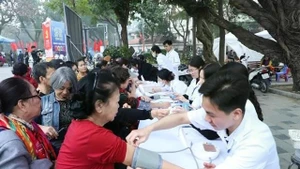According to recent statistics, 49.3% of women in Viet Nam are using modern contraceptive methods. However, the unmet need for family planning, referring to women who wish to avoid pregnancy but lack access to appropriate methods, remains at 13.5%. This figure is even higher among certain population groups, particularly ethnic minority women living in remote areas, where the rate is at 17.7%. These numbers highlight the ongoing gaps in meeting the needs of key target groups.
Viet Nam’s FP2030 National Commitment aims to directly address these disparities by expanding access amongst rural and ethnic minority communities, developing youth-friendly services that align with available access times, and ensuring services are free from stigma and discrimination. This commitment also marks a historic step in Viet Nam’s longstanding leadership in reproductive and sexual health and rights.
Speaking at the event, Permanent Deputy Minister of Health Do Xuan Tuyen affirmed that the Party and the state of Viet Nam have always paid attention to population work and continue to adjust policies in line with domestic and global contexts. Resolution No. 21-NQ/TW of the 6th Plenary Session of the 12th Party Central Committee on population work in the new context sets out goals of “All women of reproductive age have convenient access to modern contraceptive methods; reducing two-thirds of unexpected pregnancies among adolescents and young people.” Clearly, family planning remains a vital aspect of the country’s population work.
According to Deputy Minister Do Xuan Tuyen, the participation in international agreements, including FP2030, is a key action helping the Government of Viet Nam fulfil the targets of Resolution No. 21-NQ/TW on population work in the new situation, Vietnamese Population Strategy to 2030, the programme on the consolidation, development, and quality improvement of family planning services to 2030, and the sustainable development goals.
To implement the FP2030 commitment effectively, Viet Nam will pursue the following key targets: reduce unexpected pregnancies among adolescents and youth; improve the quality of and access to modern contraceptive methods, including both clinical and non-clinical options; enhance the communication and advocacy of those implementing family planning; and ensure sufficient resources to provide high-quality family planning services.
On this occasion, Sumita Banerjee, Asia-Pacific Regional Director of FP2030, praised Viet Nam’s FP2030 commitment as a demonstration of bold leadership and a people-centred vision. She emphasised that the initiative would help reduce unmet needs for family planning, prevent unexpected pregnancies in adolescents, empower youth, and protect the reproductive rights of women and girls across the country.
“Access to and voluntary use of quality family planning services is a fundamental human right. It is the foundation of gender equality, poverty reduction, and sustainable development. Today’s commitment shows that Viet Nam continues to lead by placing people, especially young people, at the heart of national development, with the aim of significantly reducing the maternal mortality rate and unmet family planning needs by 2030,” Matt Jackson, UNFPA Representative in Viet Nam, reaffirmed at the event.
Investing in family planning is not only the right thing to do, but also one of the most valuable investments a nation can make. According to UNFPA estimates, every 1 USD invested in family planning and maternal health in developing countries, will generate 8.40 USD in economic benefits for families and society through reduced healthcare costs, greater labour force participation, and the improved educational attainment and lifetime earnings of women and girls.
With technical support from development partners, the Ministry of Health will work closely with central and local agencies to implement the FP2030 commitment roadmap, ensuring family planning services are provided in a timely, comprehensive, and appropriate manner for everyone.
















